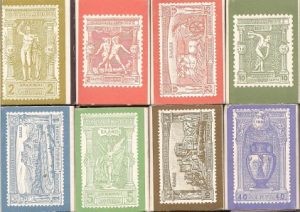
The matchboxes with the stamps of the first modern Olympic Games were released from May 1 to July 30, 1972.
The commemorative series consists of 8 pieces of paper. It differs from the later series in that it consists of 8 matchboxes, not 10 like most.
On the back they depict the
logo of the Olympic Games and they are considered as a commemorative series on the occasion of the 20th Olympics in Munich. They were released in only 3 months with a circulati
on of 30 million pieces and they are type A .
Regarding the idea on the issuance of Olympic stamps, it belonged to some Greek philatelists and was adopted by the organizing committee and then by the Greek state. The reasons were economic since the Greek state could not cover the financial cost of the games.
Private sponsorships covered much of the cost of building sports facilities in the Greek capital. Among them, George Averoff offered the high amount of about one million gold drachmas for the time, while another 400,000 were raised from the sale of the special series of stamps issued. The series includes 12 stamps of different value (1, 2, 5, 10, 20, 25, 40 and 60 cents, 1, 2, 5 and 10 drachmas), which depict 8 different representations.
Their subject refer to topics from Greek antiquity and the ancient Olympic Games. Among them are the statue of the Victory of Peony and the discus thrower of Myron.
It was not just the first Olympic series of stamps, but also the first time a sporting event became the main theme of a series of stamps around the world. Although the financing of the Games was a crucial issue in all Olympic Games, the practice of issuing a special series of stamps for the Olympic Games was not adopted at that time, until the 1920 event in Antwerp, when the Belgian state issued the second Olympic series consisting of three stamps. Since then, each host city has followed the practice of issuing Olympic stamps. It should be noted that the stamps of the first event (1896) were re-issued by the Greek state in 1996, on the occasion of the 100th anniversary of the first modern Olympic Games.

